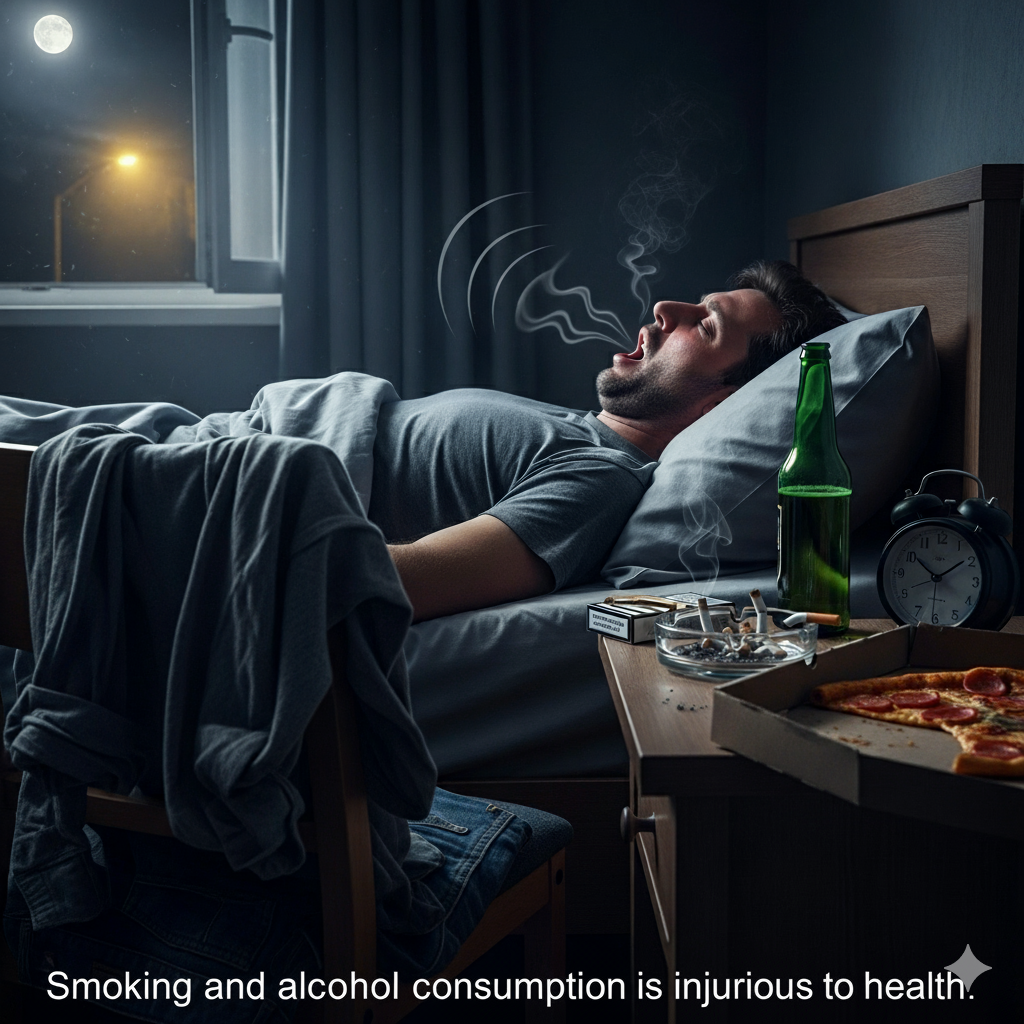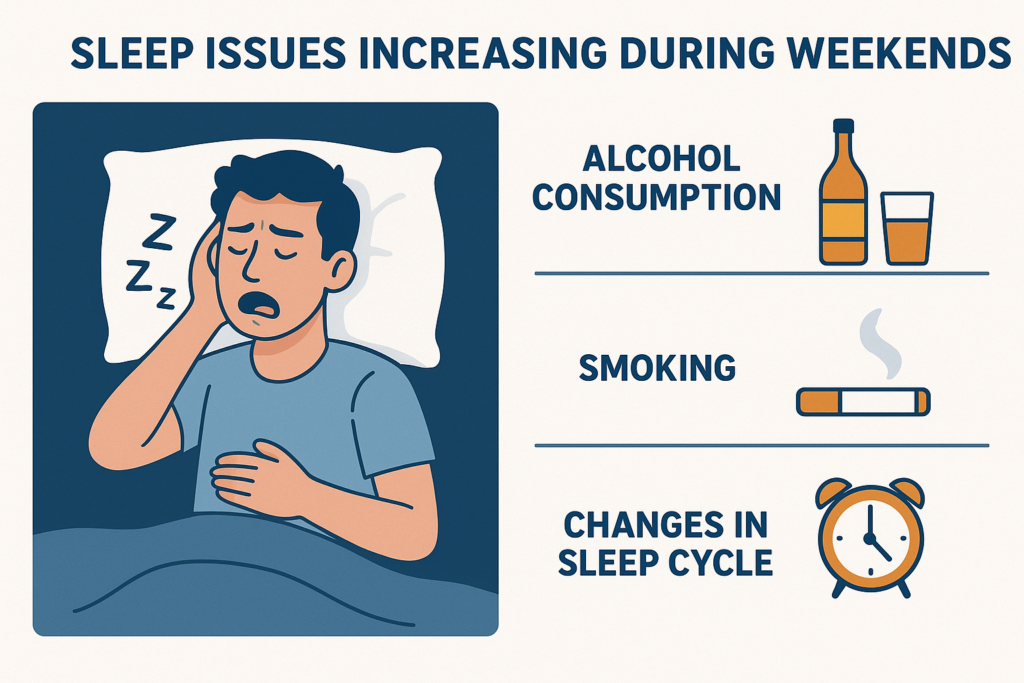The Weekend Sleep-In That Could Be Harming Your Health: Understanding “Social Apnea”
Dr. Mili Bhatt
For many of us, the weekend is a sacred time. It’s a chance to unwind, recharge, and finally catch up on the sleep we lost during the hectic workweek. But what if that long-awaited weekend lie-in was actually making a common health condition worse? New research has uncovered a surprising phenomenon that does just that, and they’ve given it a name: “Social Apnea.”
If you or a loved one has Obstructive Sleep Apnea (OSA)/Snoring issues, this is a must-read. It turns out, the very freedom of the weekend schedule could be increasing the severity of this serious sleep disorder.

What is Obstructive Sleep Apnea?
First, a quick refresher. Obstructive Sleep Apnea is a condition where your breathing repeatedly stops and starts while you sleep. This happens because the muscles in the back of your throat relax too much, blocking your airway. These pauses can last for seconds to minutes and are often followed by a loud snort or choking sound as your body struggles to breathe.
It’s more than just loud snoring; OSA can lead to serious health problems like high blood pressure, heart disease, and daytime fatigue.
The Weekend Paradox: When Rest Becomes Risky
You’d think that getting more sleep on the weekends would help. However, a groundbreaking global study of over 70,000 people found the exact opposite. Researchers discovered that sleep apnea severity significantly increased on weekends, particularly on Saturday nights.
In fact, the odds of experiencing more severe OSA were 18% higher on a Saturday compared to a Wednesday.
This is the core of “social apnea”: our social lives and weekend habits are directly impacting our breathing during sleep. So, what’s going on?
Unpacking “Social Jetlag” and Weekend Habits
The study points to a few key culprits that are familiar to almost everyone:
- Social Jetlag: This is the term for the mismatch between your body’s internal clock and your sleep schedule on weekends versus weekdays. When you stay up late and sleep in later on Friday and Saturday, you’re essentially giving yourself a mini-dose of jetlag. This disruption can throw your body’s rhythms out of whack, and the research showed that people with a “social jetlag” of 60 minutes or more saw a 38% increase in the weekend odds of OSA.
- Catch-Up Sleep: That glorious weekend sleep-in might feel great, but it can have a downside. When we sleep longer, we often spend more time in certain sleep stages, like REM sleep. For many people with OSA, their symptoms are naturally more severe during REM. The study found that getting 45 minutes or more of extra “catch-up sleep” was associated with a staggering 47% increase in the weekend odds of OSA.
- Lifestyle Factors: While the study didn’t track diet or alcohol, the researchers suggest that typical weekend behaviors likely play a big role. Increased alcohol consumption, especially in the evening, is a well-known factor that can relax throat muscles and worsen apnea. This might explain why the effect was even stronger in men and younger individuals — demographics often associated with higher weekend alcohol intake.

Why This Matters for Your Health and Treatment
This discovery has huge real-world implications:
- Inaccurate Diagnosis: Most sleep studies are done on a single weeknight. If your apnea is significantly milder on a Tuesday than on a Saturday, your diagnosis might not reflect the true severity of your condition, potentially leading to undertreatment.
- CPAP Adherence: This research highlights why it’s so critical to use your CPAP machine every single night — especially on weekends. It might be tempting to take a “vacation” from your treatment, but the weekend is precisely when your body may need it the most.
How to Protect Your Weekend Sleep
Understanding social apnea is the first step. The next is taking action. Here are a few tips to help you enjoy your weekend without compromising your health:
- Aim for Consistency: Try to go to bed and wake up within an hour of your weekday schedule. It might seem tough, but it keeps your body clock stable.
- Be Mindful of Alcohol: If you drink, try to do so in moderation and avoid it within a few hours of bedtime.
- Talk to Your Doctor: If you use a CPAP and notice your AHI (Apnea-Hypopnea Index) number is higher on weekends, or if you just feel worse after sleeping in, bring it up with your doctor. This is valuable information for managing your treatment.
- Advocate for Yourself: If you’re scheduled for a sleep study, ask about the possibility of a multi-night test to get a more complete picture of your sleep.
The weekend should be a time of rest and rejuvenation. By understanding how our social habits can affect our sleep health, we can make small changes that have a big impact, ensuring our weekends help us, not harm us.
References (APA):
Datta, S. (2025, June 12). How safe AI is in healthcare depends on the humans of healthcare. The Hindu. https://www.thehindu.com/sci-tech/science/how-safe-ai-is-in-healthcare-depends-on-the-humans-of-healthcare/article69681850.ece
Shryock, T. (2025, August 21). Health care AI oversight: What questions should doctors be asking about AI tools?Medical Economics. https://www.medicaleconomics.com/view/health-care-ai-oversight-what-questions-should-doctors-be-asking-about-ai-tools-?utm_source=chatgpt.com
